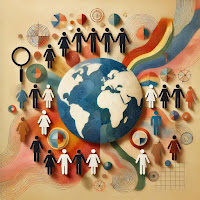Feelings are Snowballs
 |
| Illustrations by Copilot Designer |
Feelings are like snowballs. They make a small start
as minor emotions or subtle reactions. Unless they are brought under the
control of rational thought, they are likely to intensify as we dwell on them
or as new experiences amplify them. It’s just like the snowball picking up more
snow on the way and growing bigger. And bigger.
That big snowball gathers greater momentum
as it hurtles down the hill. Soon it will acquire an unstoppable energy. Quite
the same thing happens to feelings. They become powerful enough to control our
thoughts and actions. It should be the other way around: our reason should
control our emotions.
Let us consider an example.
Nationalism is a feeling. Contrast it with rational truths. A simple rational
truth is 2 + 2 = 4. Indisputable. We all learnt at school that water boils at
100 degrees Celsius. That is another indisputable truth. Unless you’re living on
Kilimanjaro where water boils at about 80 degrees Celsius. On the Everest, it
chooses to boil at 68 degrees. Well, so if the Chagga people of Kilimanjaro
take up their swords to kill you because you tell them your absolute truth
about the boiling point of water, will water become a religion like
nationalism? A disputable, relative truth?
You know enough science to tell them
that the boiling point of water is dependent on the atmospheric pressure. The
lower that pressure, the quicker the water boils. Out there in the interstellar
spaces, where there is no atmospheric pressure at all, water will boil at zero
degree Celsius. Just get the fire close to it and water will begin to boil
there.
Do people make a religion out of such
truths, however? Obviously, we know the science behind those variations and so
we let them be.
When it comes to things like
nationalism and our gods, they too should be considered intelligently if not
scientifically. If you think your country is the best in the world merely
because you were born in it, well… Isn’t that what nationalism is in the final
analysis? If you are intelligent enough, you know that all humans belong to the
same species and national borders are merely for administrative conveniences.
These borders don’t make anyone great. Greatness has to be merited by your
thoughts and deeds, not by your country’s geography.
The same argument holds good for
religious feelings too. The other day somebody sent me a WhatsApp forward, a
video in which the speaker says: “The problem with religions is that each one
claims superiority over the others. My religion is the best, my God is the only
true God, my God’s di©k is larger than your God’s….”
There’s absolutely nothing wrong in loving one’s country and one’s god(s). But if your love for a geographical and a mythical accident* makes you hate your fellow creatures, then there’s something seriously wrong. You may be letting your feelings dominate your intelligence. It will be a good idea to put the latter to good use.
* Isn’t one’s religion an accident?
How many people choose their religion? Your gods are given to you by your
family, right? Sheer accident of birth. Your nationality? As another WhatsApp
forward puts it: "Bragging about your religion or nationality is like
taking credit for the Wi-Fi password at a café—you just happened to be born
into it, buddy!"


Hari OM
ReplyDelete"Greatness has to be merited by your thoughts and deeds, not by your country’s geography."
Thank you. YAM xx
Greatness has become, for too many of us, a matter of winning an argument with someone from a rival town!
DeleteBang on buddy.
DeleteHi Parwati, here after quite a while.
DeleteNice analogy.
ReplyDeleteThank you
DeleteYeah, most people keep to the religion that their parents introduced them to.
ReplyDeleteWithout even bothering to find out what it's really about.
DeleteNot a fan of nationalism.
ReplyDeleteSo much the better for you.
DeleteInteresting way to put it. Feelings and snowballs. So rightly said. Not sure why people think their country and religion are the GOAT. Maybe it's because humility has rolled away like another snowball.
ReplyDeleteAs some writer said, those who have no trace of greatness within find joy in glorifying their god or country.
Delete